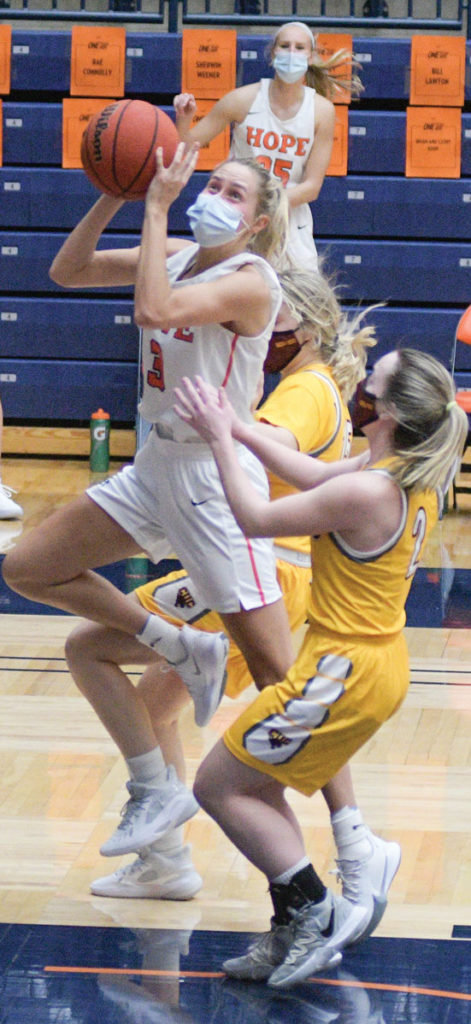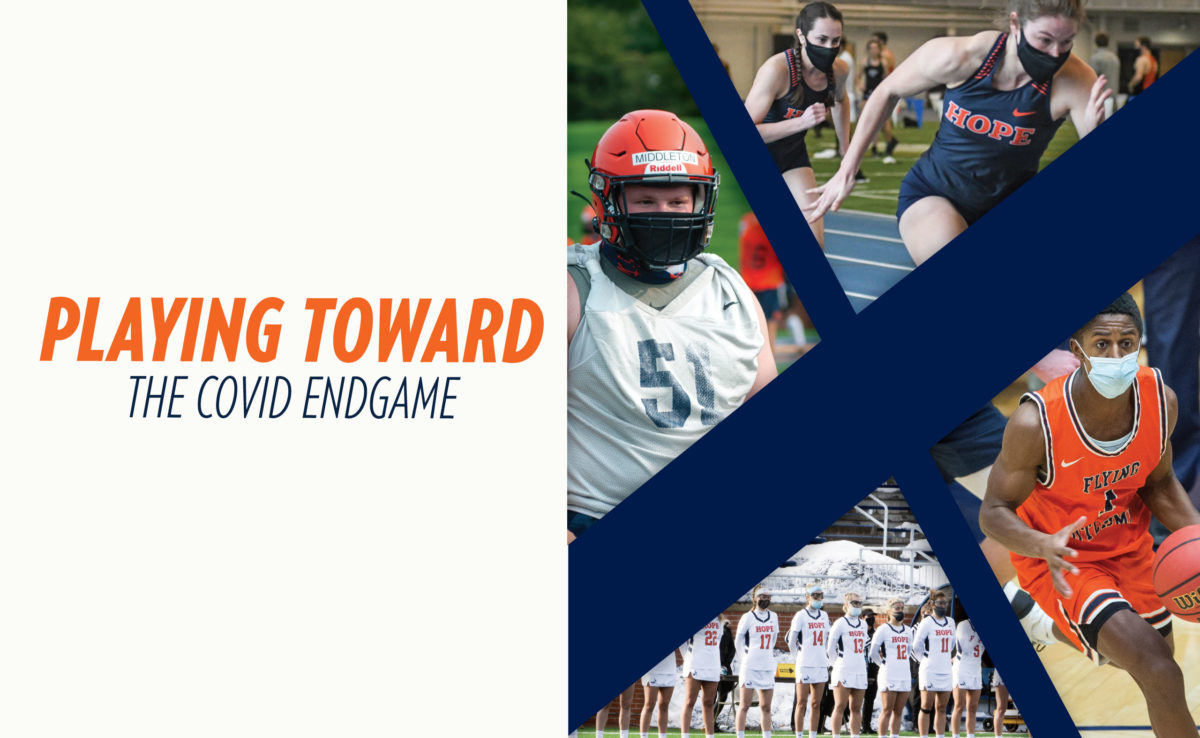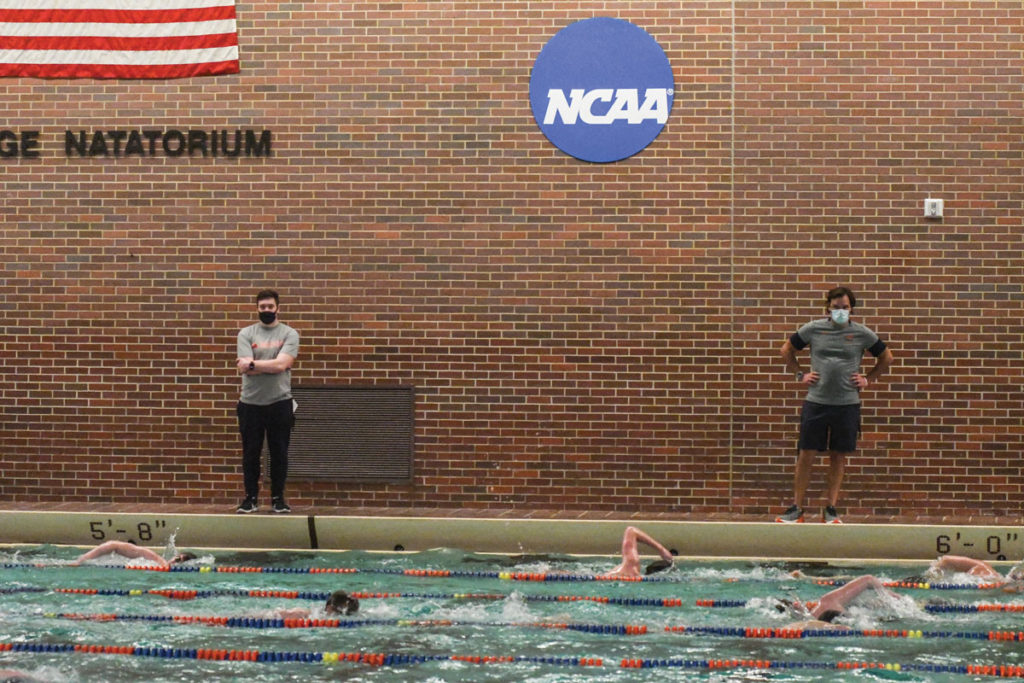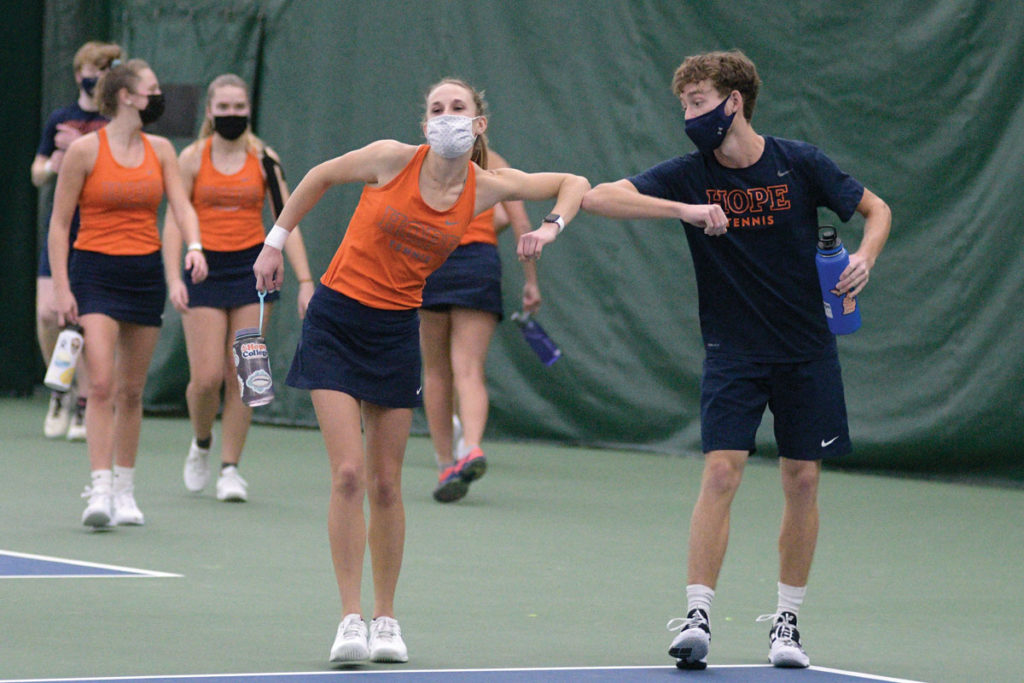Playing Toward the COVID Endgame
Just two months into 2021, a year that rang in with oxymoronic anxious optimism, heavy reality struck the Hope College athletics program with the force of a 500-pound barbell dropped from 1,000 feet.
One of the longest-standing, tradition-laden staples in Hope athletics’ diet was removed from a limited menu of competitive offerings on its plate.
For the first time since the 1944-45 season, a Hope-Calvin men’s basketball game was canceled, this time due to the impact of the COVID-19. Though the teams were cleared to play for the 204th time on January 30 (a 79-77 Hope win at Calvin), the 205th edition of The Rivalry at Hope was postponed due to COVID protocols and eventually not rescheduled, a rarity that only a world war and a pandemic could induce. When Hope-Calvin basketball gets scrapped, you know the world is wonky.
*Thanks, COVID.*
For Tim Schoonveld ’96, Hope’s director of athletics, managing challenge after challenge, not just for himself but for Hope’s 53 head and assistant coaches and more than 500 student-athletes, has been his daily existence for the past year. A man of unwavering faith who turns to scripture for inspiration, wisdom and peace, whose abiding mantra — “Choose Joy”— is prominently displayed in large, wooden, script letters in his DeVos Fieldhouse office, Schoonveld admits to being a little cantankerous on occasion about COVID uncertainties forced upon the program since last March.
Can you blame him? He is a human being. Living in a pandemic.
But he is a servant-leader, too. Putting the entire program’s needs front of brain, with the focus on providing the best possible experience for students within the necessary constraints, Schoonveld has become a decision-making Gumby® while regularly ingesting a concoction of alphabet soup. Not only must he be flexible and contort to every new scenario the pandemic forces upon the world of Hope athletics, he prioritizes the health and safety of every participant while doing so, abiding by myriad health and competition standards set forth by Hope, the Ottawa County Department of Public Health (OCDPH), the Michigan Department of Health and Human Services (MDHHS), the Michigan Intercollegiate Athletic Association (MIAA) and the National Collegiate Athletic Association (NCAA).
“The hour-by-hour decisions are unreal,” Schoonveld admits. And then he recounts the arm-long list of COVID protocols for safeguard compliance that affect game hosting, team travel, regular COVID testing, contact-tracing, and so on. All of it would make any leader’s head spin.
“When you are an administrator, you want to be organized and detailed, but right now you also have to be totally flexible. All of us do. We want to be positive and optimistic, but we also know there’s a reality that’s stressful, that’s up and down, and it’s hard. For everybody.”
To illustrate, here’s how the ever-evolving calendar has played out due to COVID-19 for Hope Athletics since the start of the 2020-21 school year:
Mid-September It is determined winter sports teams can begin to compete at the end of December.
Early November It is determined winter sports teams can begin to compete the second week of January.
November 18 to January 8 No teams practice or compete at all.
Early January It is determined winter sports can begin to compete the third week of January with no fans.
Mid-January It is determined men’s basketball can begin to compete at the end of January.
End of January Hope football cancels its spring competition schedule for non-COVID health and safety reasons and decides to focus on the Fall 2021 season.
Early February The NCAA cancels winter championships due to nationwide low participation numbers in the Division III membership.
Mid-February It is determined fan attendance by immediate family of players and coaches will be allowed league-wide.
Throughout February Multiple league contests are postponed or canceled.
March, April and May Fall and spring teams take what they can get.
So, where has Schoonveld found his joy in all that target moving? What could possibly make him smile when a litany of letdown fills his weeks? That’s one question he is quick to answer.
“One of the best days I’ve had in the last 10 months was when our basketball teams came back to campus after New Year’s, and they all tested negative,” he quickly remembered. “And then the next day they all were practicing on the court, which they hadn’t done in eight, nine weeks. And they were happy. You could hear shoes squeaking and people laughing. And you’re just like, ‘Okay, this is cool to have a little sense of normalcy for a few hours.’”
Albeit while wearing masks. (Since Hope and MIAA schools test student-athletes less frequently than Division I schools, face coverings were required during practice and competition.)
Women’s basketball student-athlete Jess Moorman says wearing an ear-looping face covering is really not any big deal. “Of course, it would be nice to not have to worry about it, but it hasn’t changed the way we practice and compete,” she says.
Such optimism from Moorman is commonplace; she was a BCAM (Basketball Coaches Association of Michigan) “Team First” award winner for the 2019-20 season for “putting team before self, teamwork, commitment, service and sacrifice.”
Yet Moorman has every reason to be sour, given how her and her team’s season ended last year and how it wasn’t allowed to end this year. Perhaps no team experienced the hardship of COVID-alterations more than Hope women’s basketball. With the team ranked No. 1 in the nation and undefeated both last year and this year with 45 consecutive wins, it could be easily argued that two national championships were within their reach if the NCAA had not canceled the 2020 and 2021 tournaments.
“It was just crushing,” Moorman says about the end of the 2020 season after her team had won the first two rounds of the national championship and was ready to compete in the quarterfinals when the NCAA pulled the plug.
“I kind of didn’t know what to do with myself after that. For me, personally, I put basketball aside. I was like, ‘That is just such a sore part of my heart right now.’ And I think I built up this wall of being like, ‘What’s the point now?’”
Indeed. Coffee without caffeine? Vacation without pictures? Sports without championships? Why bother? The answer to all those questions is usually not in any pessimist’s wheelhouse. But Moorman is no pessimist, and she eventually found a perspective on “why bother,” not only because of her own positive personality but from her four years playing for the Flying Dutch.
The “why bother” answer, be it caffeine-less coffee, photo-less travel or competition-less sport, is imbued with an affinity for the experience.
“The bottom line is, I play because I love basketball. I’ve loved it since I was a little girl shooting hoops in the driveway for hours,” explains Moorman, a mechanical engineering major from Northville, Michigan, who will graduate in May and look to enter the workforce.
“Life lessons are being learned right now. I know, you can say that happened pre-pandemic,” she continues. “But I think especially now in this time, I’m learning valuable, powerful things, like with struggle comes growth. And to be a part of something bigger than myself, learning that lesson with people who mean a lot to me even if we’re not competing for a national championship, is a blessing that I’m so grateful to have.”
Like Moorman, student-athlete Matt Middleton experienced loss and had a similar mindset when he learned that Hope football would not be competing this spring. A senior business major and offensive lineman from Scotts, Michigan, Middleton wanted to finish his final season at Hope with just one game at least. But for performance and non-COVID safety reasons, head football coach Peter Stuursma ’93, in consultation with his staff and players’ council, decided to focus on competing for an MIAA championship this coming fall and canceled league competition in the spring.
“I really, really wanted to play in my senior year and get my time in,” he said. “But at the same time, after having our meetings with Coach and [head athletic trainer] Tim Koberna and hearing about the reasons why, it didn’t feel like it was the right thing [to compete this spring].

“And even though it was a negative thing for me, I felt like for the Hope College football team, it was a positive. I’m just one person on a whole team of other people, and I think that it would be extremely selfish of me to be upset or mad at Coach, because I truly do think it’s best for the team as a whole.”
The sacrificial attitudes of hundreds of student-athletes like Moorman and Middleton make Schoonveld well up with emotion and pride. Sport is just a tool that people use to help transform the world, he likes to say. That Hope student-athletes are already using those tools is proof of the education that sports in general and Hope athletics specifically has given them during a life-changing pandemic. It’s not been easy this year, but with gratitude and clarity of purpose, the entire athletics program has forged forward toward a COVID endgame.
“The short-term goals this spring were, ‘Let’s play, let’s be safe, and let’s try to compete for championships as able,’” Schoonveld said. “But I think the longer-term goal is, ‘Hey, when we come out of this, how are we sharpening, strengthening, making ourselves better so that we are back next year better than ever?’ It’ll be a new day. And we’re so ready for that.”
The short-term goals this spring were, ‘Let’s play, let’s be safe, and let’s try to compete for championships as able.’ But I think the longer-term goal is, ‘Hey, when we come out of this, how are we sharpening, strengthening, making ourselves better so that we are back next year better than ever?’ It’ll be a new day. And we’re so ready for that.



